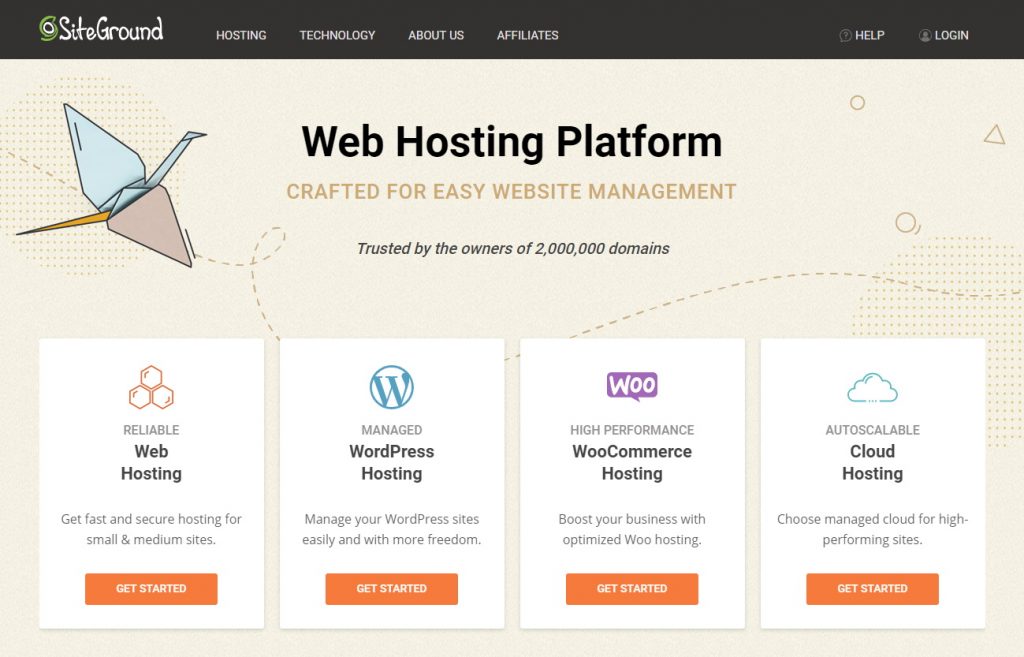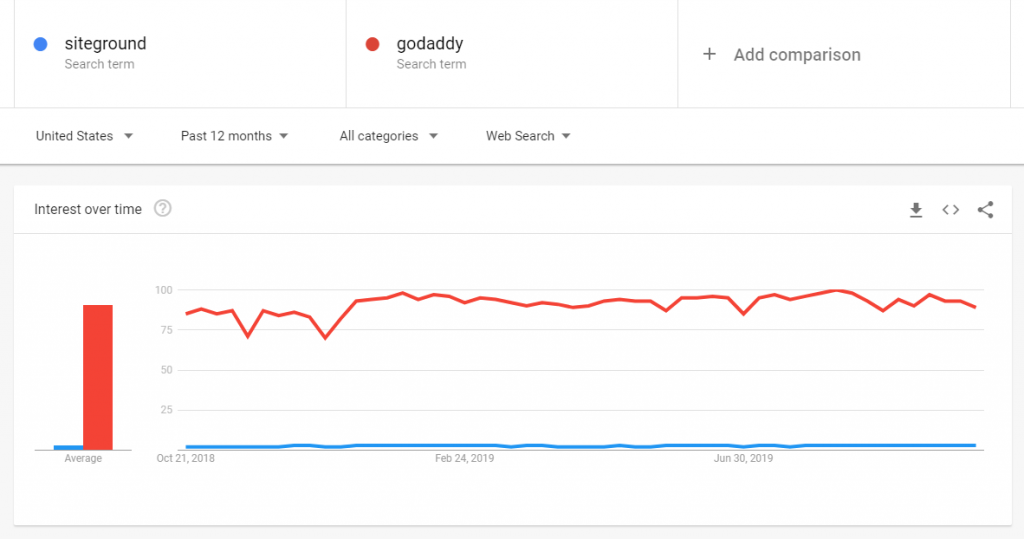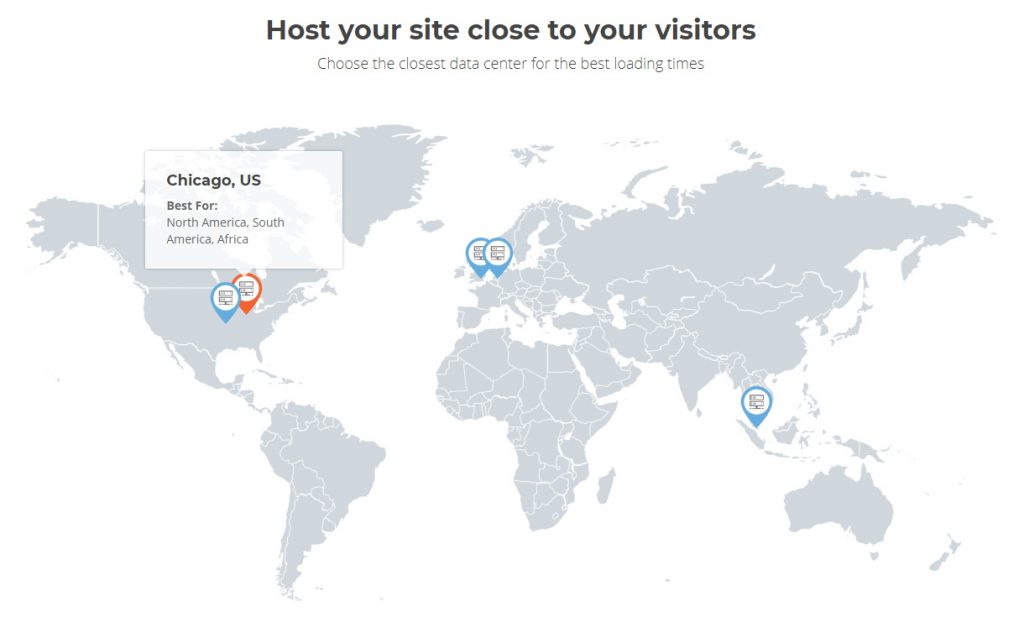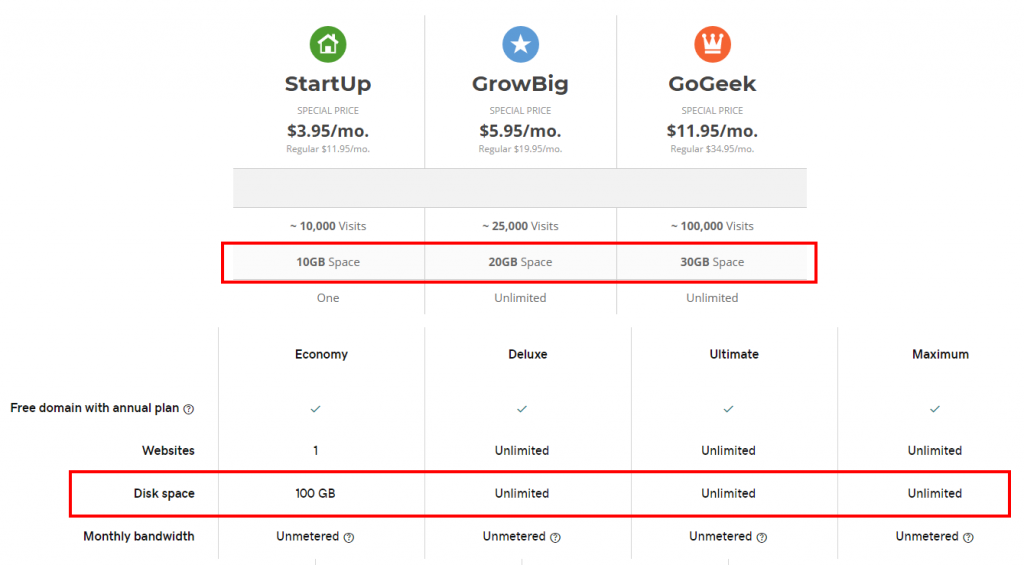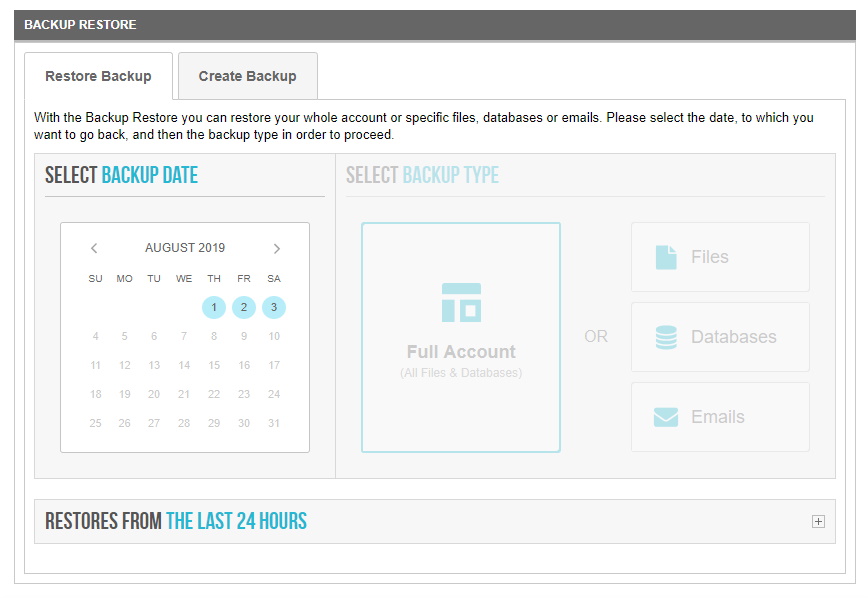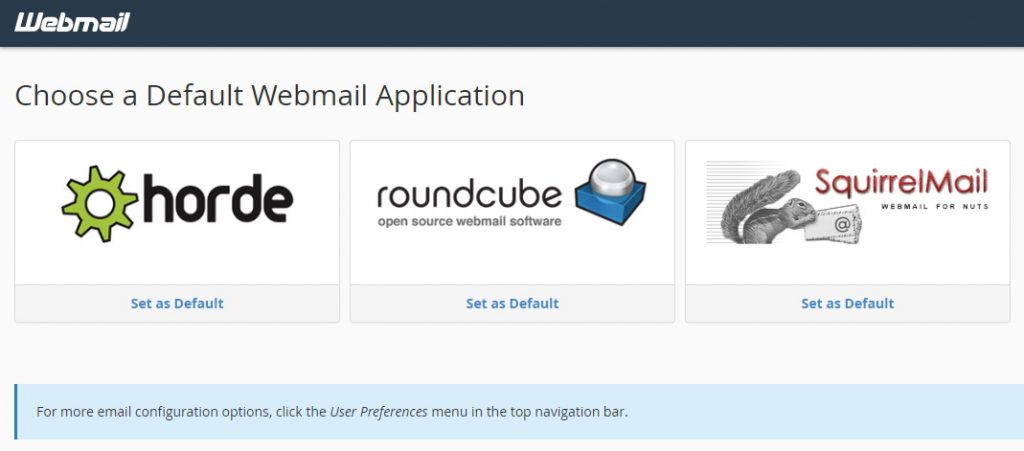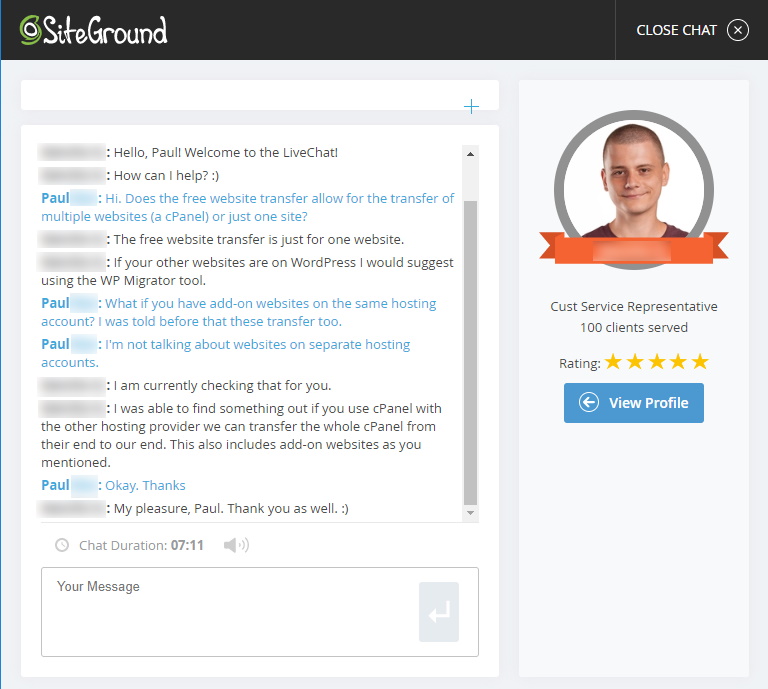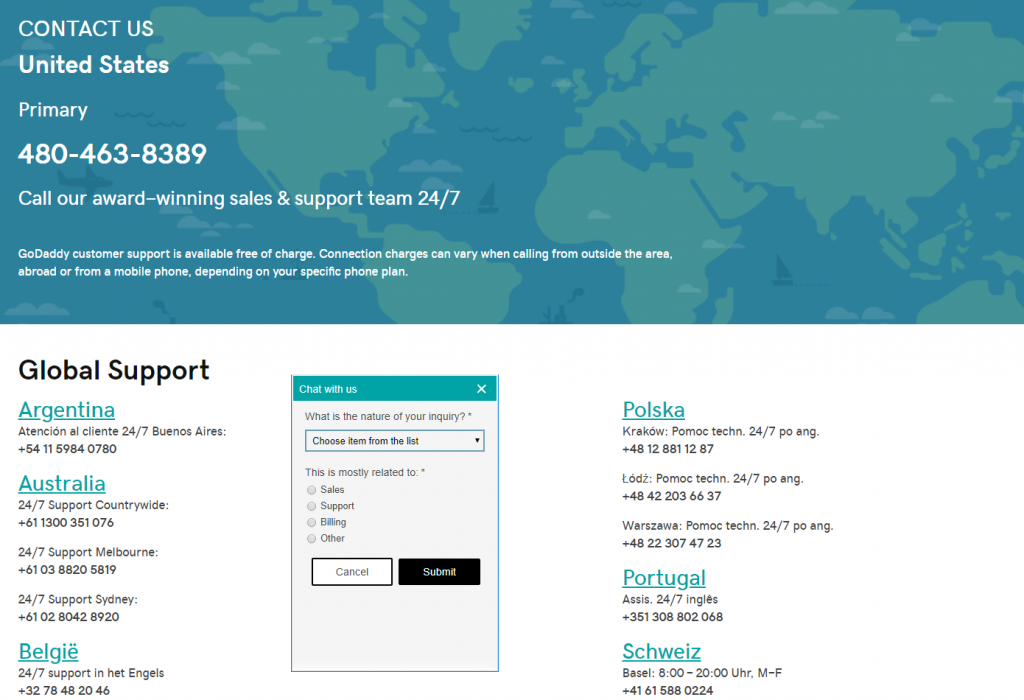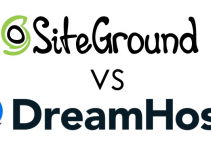Although their main focuses might be different, SiteGround and GoDaddy both offer various types of web hosting for individuals and businesses.
They both offer shared hosting, WordPress hosting, dedicated hosting, and other solutions, but which is better?
In this SiteGround vs. GoDaddy article, I’m going to compare the two web hosts in all of the important metrics, including speed, uptime, and customer support.
I myself have been serviced by both of these companies (in different capacities), and I’ll say right now that I definitively recommend one over the other.
Note that these tests and comparisons were made on the shared hosting plans, and I can’t make any definitive conclusions on other solutions like dedicated hosting. However, it’s fairly safe to extend many of the conclusions of this comparison to other plans.
The handy table below will give you a quick overview of the conclusions of my comparison. Click the entries on the left column to be taken to their corresponding sections.
| SiteGround | GoDaddy | Winner | |
| Popularity | Less popular | More popular | GoDaddy |
| Technologies | Excellent | Quite good | SiteGround |
| Features | Excellent | Great | SiteGround |
| Speed | Excellent | OK | SiteGround |
| Uptime | Excellent | Average | SiteGround |
| Support | Excellent | Great | Unclear |
| Site Transfer | First is free | Not free | SiteGround |
| Security | Great | Behind a paywall | SiteGround |
| Prices | Fair | Too expensive | SiteGround |
What solutions do they offer?
Now I’ll go over the various hosting solutions that both web hosts offer. I’ll compare price and storage later in the review.
SiteGround
SiteGround offers shared hosting plans under three types: web hosting, WordPress hosting, and WooCommerce hosting.
Each of these hosting types has three plan levels: StartUp, GrowBig, and GoGeek. StartUp allows for one domain and has the least amount of storage space, while GrowBig and GoGeek allow for unlimited domains, have more storage space, and offer additional features.
SiteGround also offers cloud hosting (hosting in the cloud with dedicated resources), dedicated servers, and enterprise hosting (custom infrastructure).
GoDaddy
GoDaddy seems to be known more as a domain registrar rather than a web host. Nonetheless, they do offer an extensive suite of hosting solutions.
They offers web hosting, business hosting, reseller hosting, and WordPress hosting. They also offer VPS (Virtual Private Server) hosting and dedicated hosting.
For the standard shared hosting, there’s the Economy Plan, Deluxe Plan, Ultimate Plan (labelled as the best value), and Maximum Plan. All but the Economy plan allow for unlimited domains.
Unlike SiteGround which has pretty tight disk space limits, the entry-level plan has a 100GB storage limit, and all other plans offer unlimited disk space.
The plans for WordPress hosting are Basic, Deluxe, Ultimate, and Pro 5+. Each plan includes a free domain, and the Ultimate and Pro 5+ plans come with a free SSL certificate.
In addition to web hosting, GoDaddy offers many others services including domain registration and email. They have a store builder and a website builder.
Popularity
Although both web hosts are well-known, GoDaddy is much more popular than SiteGround. This is evidenced by the following Google Trends graph, and also from the general interest I’ve observed:
It’s easy to understand why. GoDaddy is arguably the most popular domain registrar, and that’s where a lot of the interest comes from, even though GoDaddy offers other services including web hosting.
It’s interesting to note that when you compare SiteGround to “GoDaddy hosting” in Google trends, you see that SiteGround beats GoDaddy slightly.
SiteGround claims to host over 8,000,000 domains. GoDaddy manages well over 55 million domains, but it’s not clear how many of these domains are actually hosted with GoDaddy and not just registered with them.
It’s worth noting that a larger base of customers can make it more of a challenge for a host to manage their resources, especially on shared plans, and this often results in worse performance overall.
Winner: GoDaddy
Technologies
SiteGround has an entire section on their website dedicated to the technologies they use. They divide them into 3 categories: data centers, speed, and uptime.
In contrast, GoDaddy doesn’t have documentation of the technologies they use available on their site. I had to contact support about it.
Nonetheless, I’ve done my best to compare them. Here’s a summary:
| Technology | SiteGround | GoDaddy |
| Data Centers | Five in 3 continents | 9 in several countries |
| Solid-State Storage | Yes | Only on WordPress hosting |
| NGINX | Yes | Only on dedicated hosting |
| CDN | Yes | Yes |
| HTTP/2 | Yes | Yes |
| PHP 7 | Yes | Yes |
Let’s start with data centers.
Data Centers
The speed and stability of your website depend a lot on the location and characteristics of the closest data center. This is why it’s important to have multiple high-quality data centers in different locations, preferably in different countries and continents.
SiteGround has five data centers and provides a map with the exact locations of each (see image above). They have data centers in the USA, UK, Netherlands, and Singapore.
Thanks to GoDaddy’s IPO filing in 2014, we have information about their data centers and servers. They have 9 global data centers in Arizona (their home state), California, Virginia, Illinois, the Netherlands and Singapore.
GoDaddy owns the data center in Arizona and leases the rest.
Solid-State Drives (SSDs)
SSDs (solid-state drives) are much faster than regular hard drives. They can make a big difference in hosting performance.
SiteGround uses SSDs for all of their shared hosting plans.
Apparently, GoDaddy only offers SSD storage with their managed WordPress Hosting, and not their standard web hosting. This is disappointing because it results in hosting that is slower and less reliable.
NGINX

NGINX speeds up loading of static content on websites.
SiteGround uses a NGINX setup on all of their shared and cloud plans. GoDaddy only uses NGINX technology on their dedicated plans.
CDN, HTTP/2 and PHP 7
These technologies all result in faster loading in any part of the world.
SiteGround and GoDaddy both offer all three on shared plans.
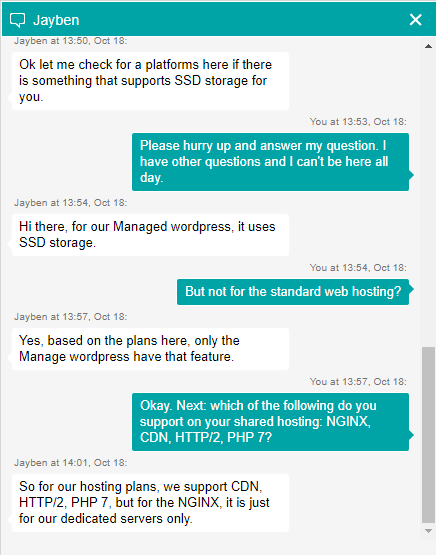
SiteGround also offers uptime technologies such as Linux containers (LXC) and anti-bot artificial intelligence. It doesn’t appear that GoDaddy uses LXC, at least on their shared plans.
Winner: GoDaddy comes admirably close (they actually have more data centers), but the winner when it comes to technology is SiteGround.
Features
When you’re considering a web host, there are many important features that you should look at.
Here are what I think are the most important features of shared plans:
Storage
This is the amount of space your websites are allowed to take up. SiteGround offers 10GB SSD on StartUp, 20GB SSD on GrowBig, and 30GB SSD on GoGeek.
GoDaddy wins on this one, at least on paper. They offer 100 GB disk space on the Economy plan and unlimited space on all other plans. However, the storage is HDD and not SSD.
Now, chances are you won’t hit SiteGround’s limits. Space may only become an issue if you upload a lot of high-res videos and images, but you shouldn’t be doing this anyway.
Winner: GoDaddy
Backups
It’s important to keep recent backups of your site in case something goes wrong.
SiteGround does a great job here. They keep daily backups of your site for 30 days on shared hosting and 7 days on cloud hosting. The backups can be easily recovered by going to the Backup Tool in the cPanel.
SiteGround also offers premium on-demand backups on the GrowBig and GoGeek plans; up to 5 of these can be created at any one time. On the StartUp plan, on-demand backups can be created for a fee.
GoDaddy, however, doesn’t appear to offer any automatic backups on their plans unless you purchase their Website Backup service for around $3/month.
Aside from this, you have to back up your GoDaddy sites manually. You can find out more about this here.
Winner: SiteGround
Websites
The ability to host multiple websites under a hosting plan can be critical to many webmasters.
Fortunately, both GoDaddy and SiteGround allow for unlimited websites and subdomains on all shared plans except the entry-level plans. However, GoDaddy only supports a limited number of sites on their managed WordPress hosting plans.
Data Transfer
GoDaddy and SiteGround both offer unmetered bandwidth, which means there’s no cap on the amount of traffic you can get.
Go ahead and grow your sites as much as you want!
Email Accounts
SiteGround allows you to create unlimited email accounts. However, each email account is limited to 2GB, 4GB, and 6GB quotas for the StartUp, GrowBig, and GoGeek plans respectively.
You can choose from 3 email clients: Horde, Roundcube, and SquirrelMail. I use Roundcube and I’ve had no problems with it.
GoDaddy isn’t as clear about their email capabilities. It turns out that they support unlimited email accounts and space for those email accounts, but only with the standard cPanel hosting. Managed WordPress and dedicated plans come with one free Office 365 mail box.
Winner: Tie. It would have been GoDaddy, but it seems that you can’t create normal email accounts on many of their plans, which is strange.
WordPress
Because a large portion of webmasters use WordPress, having hosting that is optimized for the platform can be a really great thing.
SiteGround and GoDaddy both offer managed WordPress hosting to customers. There are similarities between them, but there are also some big differences.
The first is that while both entry-level plans allow only 1 website, SiteGround’s other plans allow for unlimited WordPress sites, while GoDaddy only allows 2-50 websites.
This means that if you want managed WordPress hosting with GoDaddy but want to run more than 2 sites, your only option is the Pro 5+ plan.
However, SiteGround’s plans are meant to accommodate 10,000-100,000 monthly visits, while GoDaddy’s plans are meant to accommodate 25,000-800,000 monthly visits, which is a win for GoDaddy.
Here is a comparison of some key features in tabular form:
| Feature | SiteGround | GoDaddy |
| Quick install | Yes | Yes |
| Automatic system updates | Possible | Yes |
| Automatic plugin updates | Possible | Possible |
| Staging area | Yes | Yes |
| In-house caching plugin | Yes | No |
Winner: SiteGround. GoDaddy comes in a pretty close second because of the greater bandwidth and additional bonuses like a free domain, business email, and signup forms.
To summarize features:
- Both allow unlimited domains and subdomains on regular shared hosting.
- GoDaddy offers more storage space, but of the HDD type.
- SiteGround has a much better backup policy.
- SiteGround has a few more WordPress features.
- GoDaddy offers unlimited email storage space on cPanel hosting.
- GoDaddy doesn’t have an in-house caching system.
Overall winner: SiteGround
Speed
Speed is a very important aspect of your website. Not only does a fast website give a better experience to your visitors, but in general, search engines like Google and Bing will like you more and rank you better.
In my limited time with GoDaddy, and also from what I’ve heard and seen with other sites hosted with GoDaddy, their speed is slightly above average — a little bit better than HostGator.
In contrast, SiteGround has always been very quick for me on the shared plan. This makes it much easier for me to do work on my sites.

In terms of actual numbers, I performed a test using the GT Metrix and Webtestpage.org tools on equivalent tier shared plans. Here are the results for a particular test website:
| Test | SiteGround | GoDaddy |
| GT Metrix (Dallas, USA) | 1.05 seconds | 2.96 seconds |
| GT Metrix (London, UK) | 1.07 seconds | 3.12 seconds |
| GT Metrix (Vancouver, Canada) | 1.25 seconds | 2.53 seconds |
| Webtestpage.org (Orlando, USA) | 1.14 seconds | 3.00 seconds |
| Webtestpage.org (Phoenix, USA) | 1.27 seconds | 3.72 seconds |
| Webtestpage.org (Los Angeles, USA) | 2.01 seconds | 4.56 seconds |
It’s important to note that the exact speed of a site will depend on many factors apart from just the infrastructure of the host.
But keeping as many things constant as reasonably possible, as you can see from the data above, SiteGround beats GoDaddy by about 1-3 seconds each time.
My tests were decent, but I have heard horror stories of GoDaddy being much slower than this. They apparently reserve higher speeds and processing power for more expensive plans too.
From what I’ve heard, SiteGround’s speed was considerably worse as far back as 2016, but since then, they’ve become one of the fastest web hosts out there.
Winner: SiteGround
Uptime
Periods of downtime not only completely cut off your traffic, but they can also hurt your search engine rankings. Downtime can be caused by power downs, hardware failures, server maintenance, and other factors.
Downtime is less of a problem for some types of businesses for others (for example, a small website for a brick-and-mortar business), but it’s not a good thing in any case.
Anything under 99% uptime is unacceptable in my view. Fortunately, both SiteGround and GoDaddy guarantee uptimes of at least 99.9%.
I don’t recall ever having downtime problems since I’ve been with SiteGround, and it has been many years. You can learn about what they do to minimize their downtime here.
In practice, tests have shown that SiteGround has an uptime consistently above 99.99%. Most tests have indicated that GoDaddy has uptimes on shared plans that range from 99%-99.9%, which is okay, but clearly not as good as SiteGround.
Compensation
Hosting companies will typically compensate you in some form if your uptime dips below their guaranteed minimum.
If uptime dips below the guarantee in a particular month, SiteGround will give you a minimum of 1 month’s free hosting, with additional free months the worse the uptime is.
GoDaddy, in contrast, only offers a credit of 5% of your monthly hosting fee if uptime dips below the threshold, which is almost nothing. There are all kinds of conditions attached to this too, which nearly guarantees that GoDaddy will be able to get out of it.
GoDaddy’s compensation policy for uptime is absolutely pathetic in comparison with SiteGround’s. It just makes them look greedy, and they should be called out for it.
Winner: SiteGround
Support
Customer support makes a big difference in a web host. If support is unfriendly, unhelpful, or both, it can really leave a sour taste in your mouth.
SiteGround Support
SiteGround really puts effort into making their customer support great, and it’s something that deserves praise. They offer 24/7 live chat, ticket, and phone support – you can’t get any better than that.
They also do various things like display the personal profile of the agent you’re talking to, overstaff shifts for even quicker service, and in-house load balancing. They explain how their customer support works here.
When it comes to actual experience, I’ve contacted SiteGround support many times, and it has always been great.
The agents know their stuff, are professional and friendly. And their technical specialists are extremely skilled.
I’ve never reached out to support and not gotten my issue resolved. I talk more about SiteGround’s support in my review here.
GoDaddy Support
GoDaddy offers 24/7 phone support. They also offer live chat support, but I’m not sure if there are any schedule limitations on that.
Like other web hosts, they also have a Knowledge Base that contains helpful information about the services they offer.
I’ll definitely give GoDaddy this: they offer some of the best and most extensive phone support I’ve ever seen, which they advertise every chance they get.
They offer support for over 50 countries in many different languages, including French, Polish, Russian, Spanish, Greek, and many others, and much of this support is available 24/7.
I have contacted GoDaddy through live chat a few times. In my experience, it can take a while to connect because of long queues.
The agents often speak dodgy English and can take 5+ minutes to respond to your message. It definitely seems like they offshore their chat support.
Having said that, whenever I’ve contacted support, I was able to get my questions answered one way or another.
To sum up, their phone support is their strong point, and if you’re not opposed to talking over the phone, I would go that route.
Winner: Unclear. SiteGround’s text and ticket support is definitely better, but GoDaddy offers support for many different countries and languages.
Website Transfer
SiteGround
SiteGround offers a free professional website transfer on their GrowBig and GoGeek plans. For the StartUp plan and for additional transfers, the fee is $30.
I don’t believe there are limits on how many email accounts and websites you can transfer.
You can transfer one website or an entire cPanel that consists of multiple websites. It’s easy to request a transfer from within your hosting account.
GoDaddy
To move your websites to GoDaddy hosting, you have three options:
- Do it yourself manually.
- Pay a fee (around $100) for their site migration service.
- Use the site migration tool if you’re on a managed WordPress plan.
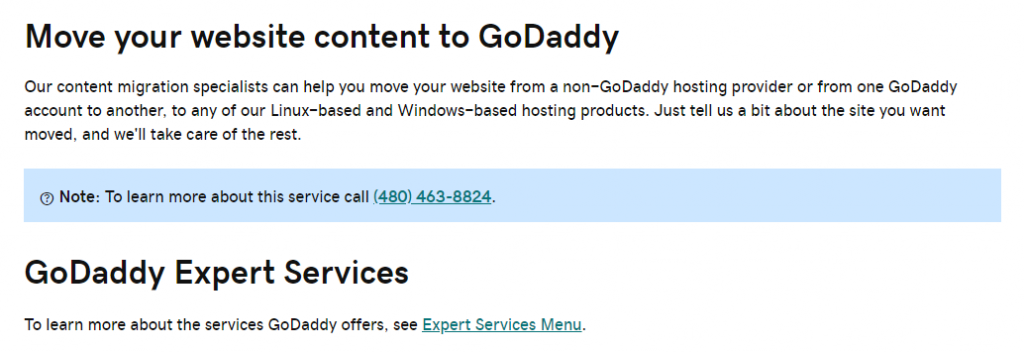
GoDaddy doesn’t have documentation on the details of their site migration service and what they can move; you’ll have to contact them directly for more information.
In any case, GoDaddy doesn’t offer a complementary free website transfer unlike other web hosts, and their migration fees are much more expensive than SiteGround’s. Pretty bad.
Winner: SiteGround
Security
Security features that protect against hacking, bots, and other attacks is critical. Let’s explore the security features of both web hosts:
SiteGround
SiteGround takes server security seriously. For starters, they have SFTP and SSH access and offer a free SSL certificate for websites. In addition, they do the following:
- set all servers to PHP 7 with the latest updates and fixes.
- run Apache in a chrooted environment with suExec.
- block malicious attackers and bots with complex IDS/IPS systems.
- protect customers from the most common attacks with ModSecurity.
Their SG Site Scanner tool is powered by Sucuri and can be used to scan for malware on a daily basis. This service costs just over $1 per month. For more information on the SG Site Scanner, go here.
GoDaddy
It’s not clear what security measures GoDaddy takes for free as part of their hosting plans.
They offer SFTP and SSH, but you have to pay for an SSL certificate, and it’s not cheap: at least $160/year for multiple domains. This is awful and just seems like a money grab.
GoDaddy also doesn’t offer firewall protection without extra cost. For that and other security features, you need to purchase their Website Security package which costs an average of $192/year (or 16 additional dollars per month).
Basically, GoDaddy takes basic security features that should be included with hosting plans or offered at a very small cost, and charges a steep fee to get access to them.
Winner: SiteGround
Prices
Price is an important consideration for many people looking to get web hosting. A piece of advice: look beyond just the plan price and see what a web host charges for extras and add-ons too.
In general, GoDaddy is a bit more expensive than SiteGround on standard and WordPress plans, but GoDaddy offers a fourth tier and there are exceptions. GoDaddy’s dedicated servers are cheaper.
It’s important to note that GoDaddy charges for many “extra services” that SiteGround includes for free in their plans. Examples are SSL certificates and some security features.
See the table below for a comparison of SiteGround and GoDaddy pricing on shared plans. Note that these prices are correct only at the time of writing and are subject to change.
| Shared Plans | Entry-Level | Mid-Level | Upper-Level |
| SiteGround – Discounted | $3.95/mo | $5.95/mo | $11.95/mo |
| SiteGround – Normal | $11.95/mo | $19.95/mo | $34.95/mo |
| GoDaddy – Discounted | $5.99/mo | $7.99/mo | $18-$20/mo |
| GoDaddy – Normal | $11.95/mo | $14.99/mo | $22-$34/mo |
As you can see, the prices are similar. It’s interesting that GoDaddy shared plans cost the same or a bit more than SiteGround plans, and yet the quality of the hosting is markedly worse.
For the list of features you get with each plan, you can see the pricing pages of each web host (SiteGround prices and GoDaddy prices) or the previous sections of this comparison.
Winner: SiteGround
The Verdict
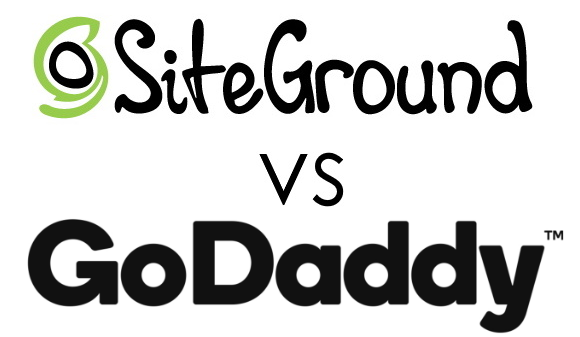
In all the categories that matter, SiteGround matches or outclasses GoDaddy.
They may be less known, but they’re transparent about what they do, they use the top technologies and have top features, they have better speed and uptime, and they give much better value for money.
Many people consider GoDaddy, in many ways, to be “garbage”, and I get where they’re coming from. In fact, I wouldn’t really recommend GoDaddy for anything. Domain registry? There are better and cheaper options. Hosting? No thanks.
They’re simply overpriced, and they try to upsell you on things that should be included with their base services. Great phone support isn’t going to make up for their problems.
And as an American company, they have a history of bending the knee to outrage mobs and putting corporate interests over a great customer experience.
GoDaddy offers a lot of services and is easily accessible, but I consider it a “suckers'” web host and domain registrar that people who don’t know any better flock to. You just don’t get your money’s worth there.
I recommend SiteGround if:
- you want superior speed and practically 100% uptime.
- you want great customer support (not just phone) that is professional, friendly, and helpful.
- you want better performance for the same price.
- 10GB-30GB of storage space is enough for you on shared plans.
- you want hosting that uses the most cutting-edge technologies.
Only consider using GoDaddy if:
- having a ton of storage space is important to you.
- you don’t mind being ripped off for services and add-on features that should be included with the base plan.
Let me be clear: GoDaddy is a decent web host that many people use and are satisfied with. I’m just saying that you can do better.
All in all, I definitely recommend SiteGround – I’ve been using them for years and I’m more than pleased.
Thanks for reading this comparison. This comparison contains affiliate links for SiteGround that I may receive a commission from. Note that the views expressed here are my own and are not official statements from the web host.
Have you used SiteGround or GoDaddy? What do you think about them? Feel free to share your thoughts in the comments.

